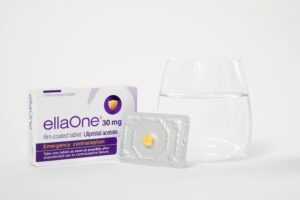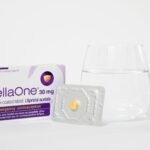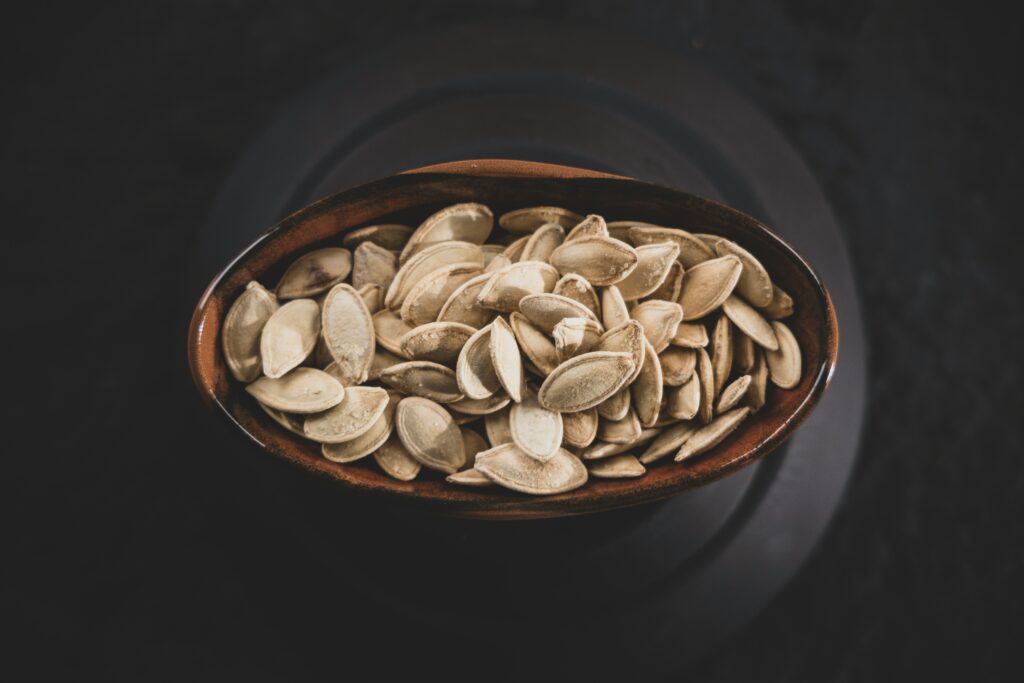
Table of Contents
Pumpkin Seeds vs. Sunflower Seeds
Are you torn between choosing pumpkin seeds or sunflower seeds? These small but mighty snacks have been gaining popularity for their nutritional value and versatility. In this comprehensive guide, we’ll delve into the nutritional profiles, health benefits, flavors, and more to help you make an informed decision. So, let’s crack open the pumpkin and sunflower seed debate and discover which one reigns supreme.
Understanding the Nutritional Value
When it comes to comparing pumpkin seeds and sunflower seeds, both offer a nutrient-packed punch. Let’s break down their nutritional profiles to see what each seed has to offer.
Pumpkin Seeds
A quarter-cup serving of pumpkin seeds, equivalent to roughly one ounce, provides a wealth of nutrients that contribute to overall well-being. These green powerhouses are rich in protein, healthy fats, magnesium, zinc, and potassium. With 10 grams of protein and 1.5 grams of fiber, pumpkin seeds make a satisfying snack that supports various bodily processes and aids in digestion.
Sunflower Seeds
Sunflower seeds, available both in shelled and unshelled forms, also boast an impressive nutritional profile. A quarter-cup of shelled sunflower seeds offers 6 grams of protein and 2 grams of fiber. Additionally, they are high in vitamin E, B vitamins, copper, and magnesium. These nutrients play a vital role in supporting immune health, reducing inflammation, and maintaining healthy cholesterol levels.
Both pumpkin seeds and sunflower seeds contain protein, dietary fiber, and healthy fats, which contribute to a feeling of fullness and aid in digestion. Pumpkin seeds have a slight edge in protein content, while sunflower seeds are higher in fat and fiber.
Unveiling the Health Benefits
Both pumpkin seeds and sunflower seeds offer a range of health benefits, thanks to their nutrient profiles. Let’s explore the unique advantages of each seed.
Pumpkin Seeds
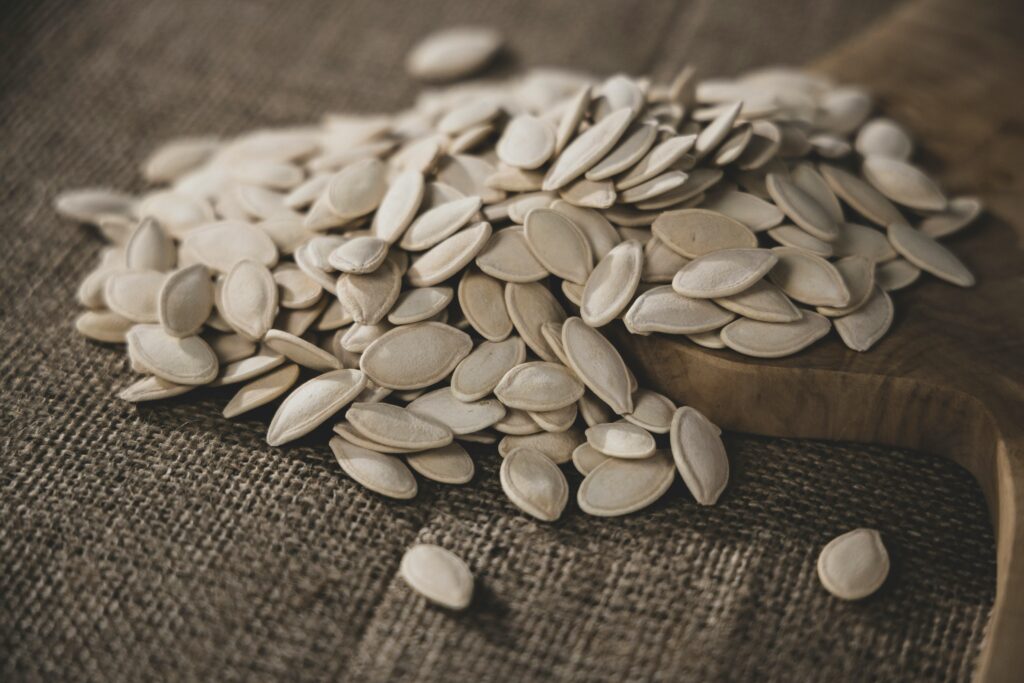
Pumpkin seeds have been linked to various health benefits, including:
1. Lowering Blood Pressure and Reducing Heart Disease Risk
The magnesium content in pumpkin seeds may help lower blood pressure and reduce the risk of heart disease. Incorporating pumpkin seeds into your diet can contribute to a healthier cardiovascular system.
2. Anti-Inflammatory Properties
Pumpkin seeds contain compounds that possess anti-inflammatory properties, which may help reduce inflammation in the body. By incorporating these seeds into your routine, you can potentially alleviate symptoms associated with inflammatory conditions.
3. Supporting Prostate and Breast Health
Research suggests that pumpkin seeds may have a protective effect against prostate and breast cancers. These seeds contain compounds that have been shown to inhibit the growth of cancer cells, making them a valuable addition to a cancer-preventive diet.
4. Stabilizing Blood Sugar Levels
The nutrients found in pumpkin seeds, including magnesium and fiber, contribute to stabilizing blood sugar levels. Incorporating these seeds into meals can help maintain steady energy levels and support overall glucose control.
Note: Explore “Which Dry Fruits are Good for Diabetes Management”
Sunflower Seeds
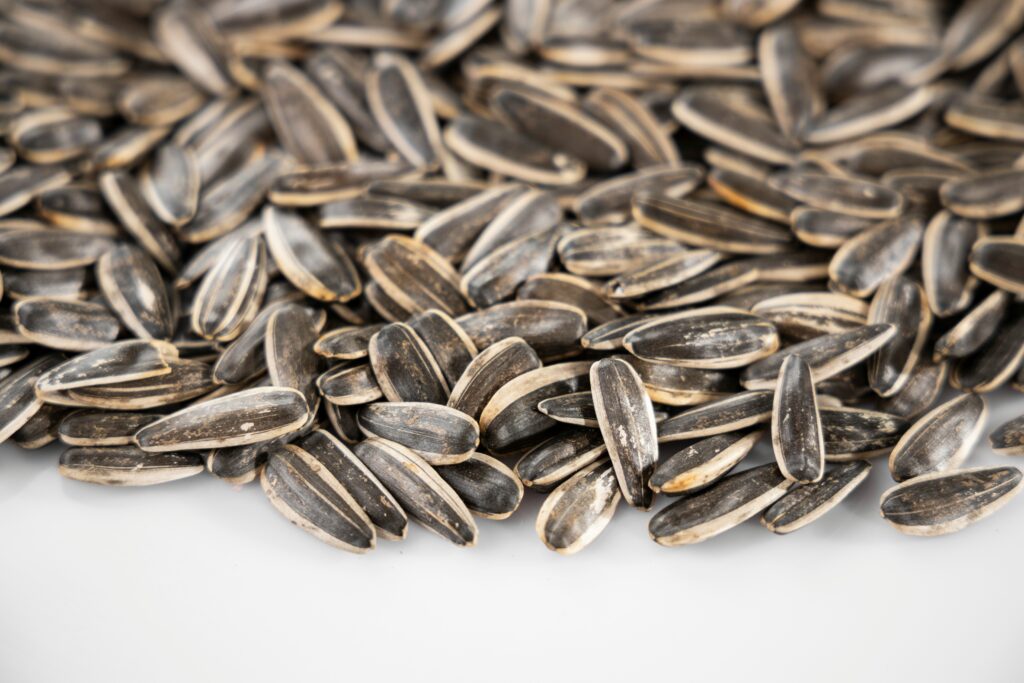
Sunflower seeds also offer several health benefits, including:
1. Cancer Prevention
Sunflower seeds contain compounds that have been associated with reducing the risk of certain cancers, including breast cancer. These compounds possess antioxidant properties that protect cells from damage and promote overall cellular health.
2. Cholesterol Management
The phytosterol content in sunflower seeds has been shown to help reduce LDL cholesterol levels, often referred to as “bad” cholesterol. Including sunflower seeds in a heart-healthy diet may contribute to maintaining healthy cholesterol levels.
3. Immune System Boost
The high vitamin E content in sunflower seeds supports a robust immune system. Vitamin E is well-known for its antioxidant qualities, which help protect cells from the damage caused by free radicals.
4. Blood Sugar Regulation
Sunflower seeds, like pumpkin seeds, can aid in stabilizing blood sugar levels. The combination of healthy fats, fiber, and protein in these seeds helps slow down the absorption of glucose, promoting balanced blood sugar levels.
While further research is needed to confirm the full extent of these benefits, it’s evident that both pumpkin seeds and sunflower seeds offer valuable contributions to a healthy diet.
Exploring Flavors and Culinary Uses
When it comes to taste and versatility, pumpkin seeds and sunflower seeds each bring their unique characteristics to the table.
Pumpkin Seeds
Pumpkin seeds have a delightful combination of flavors, including a slight sweetness, nuttiness, and earthiness. They offer a satisfying crunch that adds depth to dishes. These seeds can be enjoyed roasted or raw and make a fantastic addition to salads, yogurt, oatmeal, trail mix, or baked goods. Get creative and experiment with incorporating pumpkin seeds into your favorite recipes to enhance both flavor and nutrition.
Sunflower Seeds
Sunflower seeds have a milder nutty flavor compared to pumpkin seeds. They are equally versatile and can be enjoyed roasted or raw. Sprinkle them on top of soups, salads, smoothie bowls, or warm bowls of oatmeal to add a delightful crunch. Sunflower seeds also make a great addition to homemade granola or can be ground into a creamy sunflower seed butter, serving as a nut-free alternative to traditional nut butters.
Ultimately, the choice between pumpkin seeds and sunflower seeds comes down to personal preference and the flavors you enjoy most. Don’t be afraid to experiment and discover new ways to incorporate these nutritious seeds into your meals.
Allergies and Seed Alternatives
If you have nut allergies or are looking for allergen-friendly alternatives, both pumpkin seeds and sunflower seeds are excellent choices. They provide a similar satisfying crunch and can be used as substitutes for nuts in various recipes.
Sunflower seed butter, such as SunButterⓇ, offers a versatile and allergy-friendly alternative to peanut butter. Pumpkin seed butter, like the one from 88 acres, provides a flavorful and nutritious option for those with nut allergies. These seed butters can be used as spreads, incorporated into baked goods, or enjoyed as a dip for fruits and vegetables.
How to Incorporate Seeds into Your Diet
Seeds, including pumpkin seeds and sunflower seeds, are an excellent addition to a balanced diet. Here are some creative ways to incorporate these nutrient-rich gems into your daily meals:
- Sprinkle roasted seeds on top of salads for added crunch and nutrition.
- Blend seeds into smoothies for a boost of protein and healthy fats.
- Use seeds as a topping for yogurt, oatmeal, or overnight oats to enhance flavor and texture.
- Add seeds to homemade granola or energy bars for an extra nutrient punch.
- Incorporate seeds into baked goods, such as bread, muffins, or cookies, for added texture and nutritional value.
- Mix seeds into trail mix or enjoy them on their own as a satisfying snack.
There are countless ways to incorporate seeds into your diet. Get creative and try out different combinations to see what works best for you.
Note: Explore our blog on STI Vs STDs
The Verdict: A Tie in Nutritional Power
In the battle of pumpkin seeds vs. sunflower seeds, both emerge as winners in terms of nutritional value and health benefits. Pumpkin seeds offer a higher protein content, while sunflower seeds boast more healthy fats and fiber. Both seeds provide essential nutrients, including vitamins, minerals, and antioxidants, that support overall health and well-being.
When choosing between pumpkin seeds and sunflower seeds, consider your personal preferences and health goals. Incorporating a variety of seeds into your diet can provide a diverse range of nutrients and contribute to a well-rounded eating plan.
So, whether you’re snacking on pumpkin seeds or enjoying the mild nuttiness of sunflower seeds, rest assured that you’re making a nutritious choice that adds both flavor and health benefits to your meals. Embrace the power of seeds and let them elevate your culinary adventures.
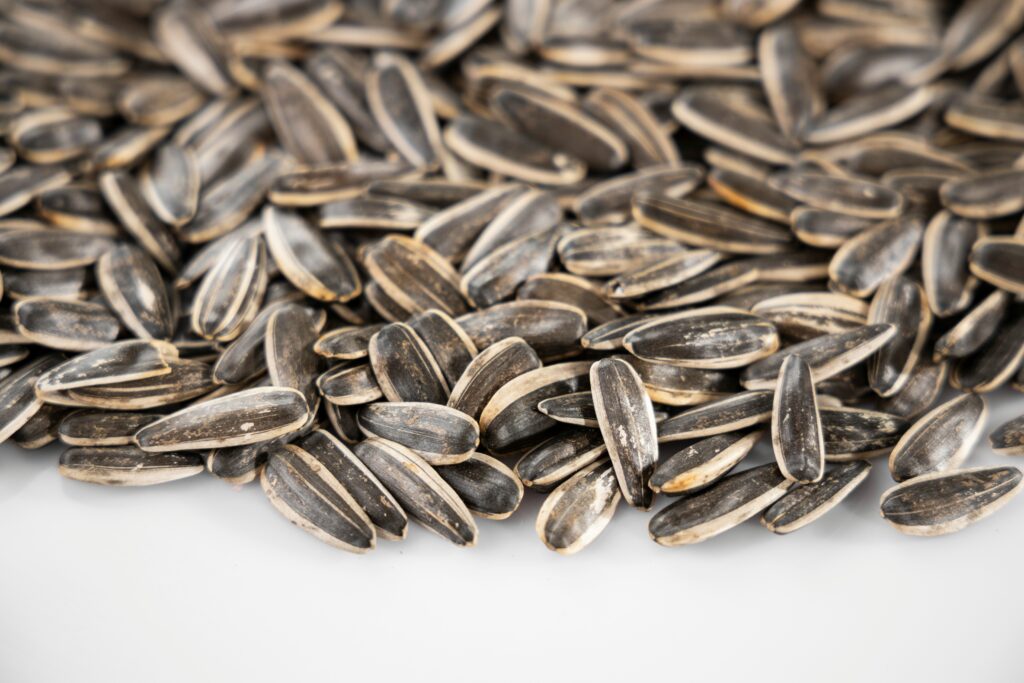
Disclaimer:This article is intended to provide information only and should not be used as a substitute for professional medical advice or treatment. Please consult with a healthcare professional before making any dietary changes or if you have specific health concerns.
Additional Information:
- Always choose organic and non-GMO seeds whenever possible to ensure the highest quality and minimize exposure to pesticides.
- Remember to consume seeds in moderation as part of a balanced diet. While they offer numerous health benefits, they are calorie-dense, and excessive consumption may contribute to weight gain.
- Store seeds in a cool, dry place to maintain their freshness and prevent rancidity. Consider using airtight containers or storing them in the refrigerator or freezer for extended shelf life.
- Be aware of any allergies or sensitivities to seeds. If you experience any adverse reactions, discontinue consumption and consult a healthcare professional.
Now that you have a better understanding of the nutritional battle between pumpkin seeds and sunflower seeds, embrace the versatility and health benefits of these tiny powerhouses. Whether you’re enjoying them as a snack, adding them to your favorite recipes, or using them as a nut-free alternative, let pumpkin seeds and sunflower seeds enhance your culinary journey and support your overall well-being.
Note: Explore our blog on “Can Follicular Study Confirm Pregnancy?”
FAQs
What are pumpkin seeds and sunflower seeds?
Pumpkin seeds and sunflower seeds are edible seeds that are harvested from the respective plants. They are commonly consumed as snacks or used in various culinary dishes.
What are the health benefits of eating pumpkin seeds and sunflower seeds?
Both pumpkin seeds and sunflower seeds offer numerous health benefits, including improved heart health, enhanced immunity, and support for bone health. They also include antioxidants, which help to combat inflammation and oxidative damage.
Which seed is better for weight management: pumpkin seeds or sunflower seeds?
Both pumpkin seeds and sunflower seeds can be part of a healthy weight management plan due to their high protein and fiber content, which helps promote satiety and reduce appetite.
Do pumpkin seeds and sunflower seeds have any potential allergens?
While pumpkin seeds and sunflower seeds are generally well-tolerated, some individuals may be allergic to seeds and should avoid consuming them. It’s essential to check for any potential allergens and consult with a healthcare professional if you have concerns.
Can pumpkin seeds and sunflower seeds be incorporated into a balanced diet?
Yes, pumpkin seeds and sunflower seeds can be incorporated into a balanced diet as part of a diverse range of nutritious foods. They provide essential nutrients and can contribute to overall health and well-being when consumed in moderation.


